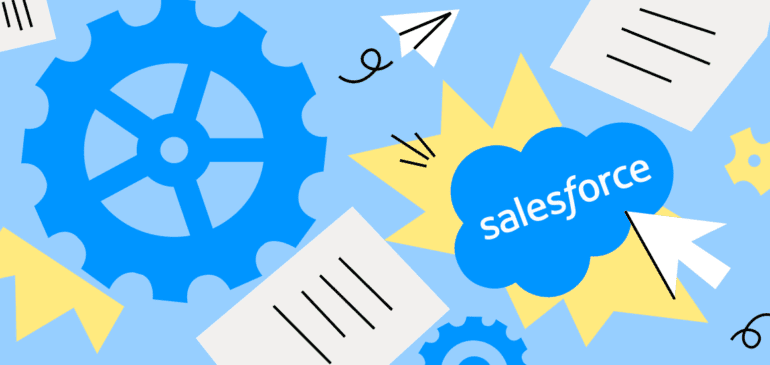TL;DR:
- Google Cloud and Salesforce form a strategic partnership to enhance AI offerings.
- The collaboration enables businesses to leverage data and custom machine learning models to anticipate customer needs.
- Products and services involved include Google’s BigQuery, Salesforce’s Data Cloud, and Google’s Vertex AI.
- The partnership aims to democratize AI by providing customers with a choice of AI technologies.
- This is the second major partnership between Google and Salesforce, expanding on their previous collaboration in analytics and big data.
- Salesforce’s focus on becoming a “data company” aligns with the partnership’s goals.
- Google Cloud’s position in the market and profitability, combined with Salesforce’s vast customer base create a compelling opportunity.
- Integrations between Data Cloud and BigQuery, as well as Data Cloud and Vertex AI streamline data analysis and model development.
- Use cases include predictive modeling for customer preferences in fashion retail and anticipating spending habits in financial institutions.
Main AI News:
In a move that highlights their commitment to advancing artificial intelligence (AI) capabilities, Salesforce and Google Cloud have announced a new strategic partnership. This collaboration aims to enable businesses to harness the power of data and leverage custom machine learning models to anticipate customer needs. By combining their respective strengths, Google and Salesforce are set to revolutionize the AI landscape.
The partnership encompasses a wide range of products and services, including Google’s robust BigQuery tooling, Salesforce’s Data Cloud, and Google’s Vertex AI platform, a comprehensive and fully managed AI solution. This integration will democratize AI by empowering customers to choose the AI technologies that align with their specific requirements.
David Schmaier, Chief Product Officer at Salesforce, emphasized the significance of this collaboration in an interview with TechCrunch, stating, “This really allows us to democratize AI so that customers get choice on which AI they want to use.”
This is not the first instance of collaboration between Google and Salesforce. Their initial partnership in 2017 was primarily focused on analytics and big data. Since then, the companies have deepened their collaboration, expanding data sharing initiatives and developing AI-infused customer service and marketing tools.
The partnership aligns with Salesforce’s strategic goal of positioning itself as a “data company.” In recent months, Salesforce has introduced innovative generative AI tools, such as EinsteinGPT and SlackGPT, which enhance customer relationship management (CRM) tasks and facilitate natural language processing for Slack content.
Salesforce Ventures, the corporate investment arm of Salesforce, has also demonstrated its commitment to the generative AI ecosystem. In March, they launched a $250 million fund dedicated to “responsible” generative AI startups, aiming to stay at the forefront of emerging AI technologies.
For Google, this renewed partnership with Salesforce underscores its leadership in big data analytics and AI services. Salesforce’s extensive customer base, comprising over 150,000 organizations, presents a significant opportunity for Google Cloud. Although currently ranked third in the U.S. cloud infrastructure market, Google Cloud recently reported its first profitable quarter, showcasing its strength in the industry.
Google Cloud CEO Thomas Kurian explained the value of the partnership, stating, “From our point of view, this partnership brings two very large ecosystems of data together and makes it much simpler and easier for customers to get value.”
The integration between Salesforce’s Data Cloud and Google’s BigQuery will provide companies with unified customer profiles, simplifying data analysis across the platforms. Furthermore, the connectors between Data Cloud and Vertex AI will enable companies to seamlessly utilize AI models trained in Vertex across the Salesforce platform. This streamlines the model development process and enhances overall efficiency.
Salesforce provided several compelling use cases for the new integrations and connectors. For instance, a fashion retailer can leverage CRM data, including purchase history and service interactions, along with non-CRM data like social media sentiment, to develop a custom AI model that predicts customers’ clothing preferences. Similarly, a financial institution can combine CRM and non-CRM data to anticipate customer spending habits and investment preferences.
The success of these new integrations and connectors will depend on customer adoption. However, both Kurian and Schmaier expressed confidence in the comprehensive offerings of this cross-platform collaboration.
Kurian affirmed, “Our general view is, these AI models are going to get richer and richer and much more sophisticated… to enable productivity and efficiency for people doing work, and then integrating all the information to make better decisions.”
The integration between Data Cloud and Google Vertex AI will enter the pilot phase in July 2023 and become generally available in October 2023. Similarly, the Data Cloud and BigQuery integration will commence its pilot phase in October 2023, with general availability scheduled for February 2024. This timeline underscores the commitment of Google and Salesforce to deliver cutting-edge AI solutions in a timely manner.
Conclusion:
The strategic partnership between Google Cloud and Salesforce signifies a significant advancement in the AI market. By joining forces, these industry giants are democratizing AI, enabling businesses to harness the power of data and machine learning to deliver personalized customer experiences. The integrations and connectors offered through this collaboration streamline data analysis and model development, empowering companies to make more informed decisions. With their combined expertise and resources, Google Cloud and Salesforce are poised to drive innovation and shape the future of AI solutions in the business landscape.

